“Black death” – (2010), UK/Germany, 97 minutes – rated R)
In 1348, the plague known as ‘black death’ is cutting wide and deep through the populations of Europe and has reached England with a vengeance. Some men have taken to question God, while others blame Him outright, forcing the Catholic Church to take drastic measures to assert itself.
Watch the trailer here:
Those communities not yet affected by the disease come under suspicion of witchcraft and emissaries are sent to investigate and return proof to the religious authorities.
Ulric (Sean Bean) and his men are such emissaries. They are soldiers in the service of the Church, particularly Ulric, who is a special type of believer where the others are more or less disillusioned in all but each other.
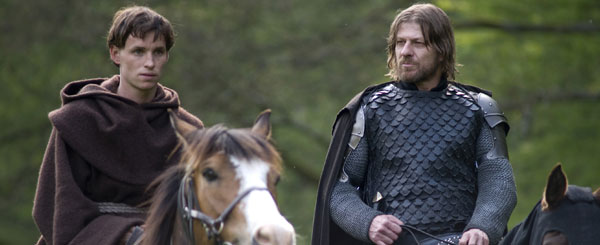
Ulric stands apart as a man who has suffered and lost much while inflicting suffering upon others, a man who justifies everything as necessary to follow God’s will, the way he interprets it.
Their arrival in a village ravaged by the black death is taken as a sign from God by novice monk Osmund (Eddie Redmayne), trying to choose between following his earthly love Averill (Kimberly Nixon) and remaining at the parish with the monks.
Osmund is a peculiar young man himself, with an understanding of Christianity which doesn’t seem quite as dogmatic as the monks’. He feels it natural to love both God and a woman, for instance.
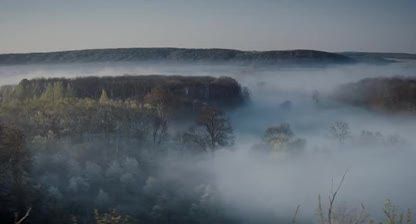
Ulric is looking for a guide to take him and his men through a valley to a village rumored to be under the influence of a Necromancer. He aims to capture the Necromancer and take him back to the Bishop, once he finds him and evidence of his crimes: bringing the dead back to life, rejecting God in favor of Pagan and Satanic rites, the usual stuff English people are likely to be doing in the countryside, according to Hammer and other films.
The Abbot (David Warner) tries to dissuade Osmund after the novice volunteers to guide the soldiers, but Osmund is really thinking with his smaller head at this point, hoping to reunite with Averill, whom he sent back to her village in hopes she would be safer. On their journey through the valley, it does not take long for Osmund to realize that the truth of Ulric and his men is much more brutal than he might have thought. They travel with a spikey sarcophagus/contraption thingy designed to inflict maximum pain on whomever they identify as having rejected God, operated by one of the men who introduces himself as a ‘torturer’.
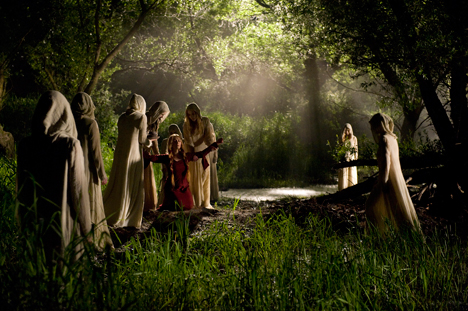
Little did Osmund know when he figured he’d ride with them, but the worst is yet to come. I was curious to see what director Christopher Smith would be up to after watching his 2004 film “creep”, a horror film with Franka Potente running from a deformed monster in the London underground tunnels, which had some very brutal moments. I liked that Smith left room for the audience to imagine what happened during some of the goriest moments, rather than put it on display.
I also appreciated that Potente’s character was not immediately easy to relate to, but eventually expressed humanity in a believable way as the story progressed. I think the same could be said of “black death”, although the character who I found easiest to relate to was one of Ulric’s men, Wolfstan (John Lynch) who did double duty as narrator.
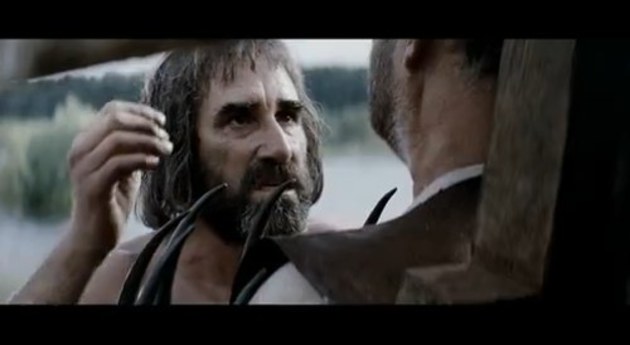
Smith described ‘black death’ as ‘medieval guys on a mission’ and perhaps more accurately as a journey into the heart of darkness.
‘Black death’ does echo both Joseph Conrad’s novella ‘heart of darkness’ and its adaptation ’Apocalypse Now’: in one scene, Ulric, Osmond and the others happen upon a group of peasants getting up to burning a local woman, claiming she’s a witch who poisoned their well with pestilence. Osmund intervenes and is immediately overwhelmed.
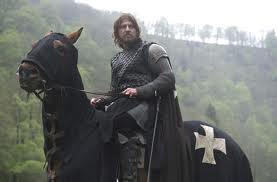
Ulric pushes the peasants aside and leads the woman who still shouts her innocence away from the mob. He then cuts her throat with his dagger and lets her fall to the ground. Ulric later ‘explains’ to Osmund that he spared her great suffering as she was about to be burned alive. Had they just rescued her and let her go on her way, the peasants would have caught up with her again and burnt her anyway. The object of the lesson: don’t stop. For anything.
Just as Captain Willard (Martin Sheen) in ‘Apocalypse Now’. When the patrol boat stops to inspect a Vietnamese fishing boat and it is strafed by a freaked out machine gunner high on drugs, the crew finds an injured woman on board and wants to take her back to their last stop for medical treatment. Willard finishes her off and tells the crew chief “I told you not to stop”.
But ‘black death’ also echoes another classic of British horror, ‘the wicker man’, in which a Christian policeman tries to establish justice and morality in a village whose inhabitants follow Pagan rites.
“Black death” is not meant to be all too realistic, rather it explores mystical themes which could be considered relevant today. Once Ulric and Osmund arrive at their destination, the horrific conflagration which follows will put Osmund on a Nietzschean path, having skinny-dipped his soul into the abyss.
Well acted and directed, beautifully shot in Germany with a German crew, ‘black death’ avoided going loud with violence and gore: the mood and tone achieve great pitch, and even though the ending may put some viewers off, I found it gave not only an inkling of what Osmund’s future will be, but also an insight into Ulric’s past.
Magnet releasing (the “genre” branch of Magnolia) is having quite a streak with “black death”, “hobo with a shotgun”, “I saw the devil” and “Rubber”. Here’s to continued success..!
“Black death” gets 4 jellybeans.




Hehehe!! I just bought this one yesterday!
You beat me to it… but at least it sounds like Carolyn and I will enjoy it. I figured it would be a version of that Nicolas Cage film, “Season of the Witch”, but I’m thinking it’s going to be a much better effort overall.
Thanks for the timely review!!